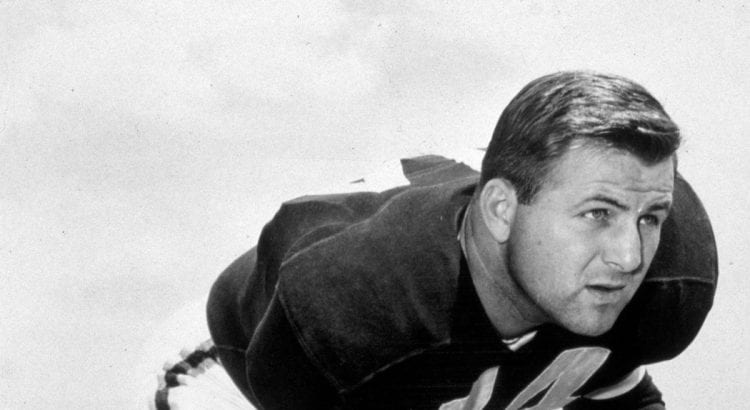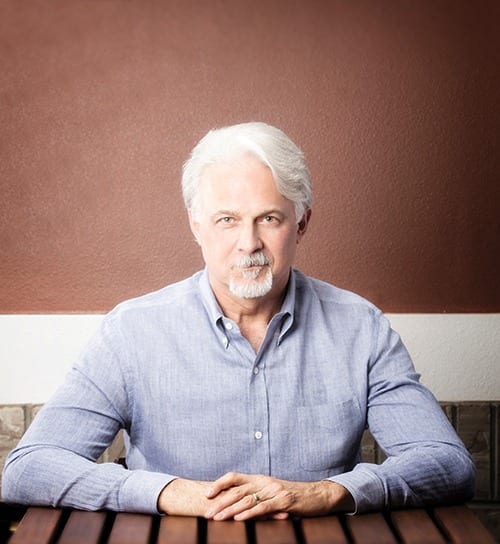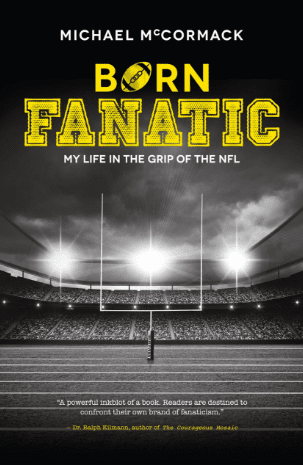Michael McCormack’s new book, Born Fanatic: My Life in the Grip of the NFL, began as a letter of complaint to his father, who was a world champion football player (Cleveland ftw! For once!), NFL coach, and hall of famer also named Michael McCormack.
But he never envisioned what writing his story would turn into: A balm of healing for some of the wounds left behind by their dissonant relationship.
Similarly, Born Fanatic is a football memoir, but it’s much more than that. It’s a tale of father and son, country and game, money and love, addiction and recovery.
McCormack’s painfully honest retelling of his family’s football fanaticism and his father’s abuse and its influence on his own addiction is destined to pay that healing forward. Readers will find threads of their own story woven throughout the tough pigskin of his.
It will also offer hope. The pair slowly began to mend their relationship through their undying love of football. As McCormack wrote, he began to understand his father better. In this is an important lesson: Forgiveness doesn’t have to mean you think what happened was OK.
Set for release on April 24, get your pre-order today. I watch football for the tight pants and still found a lot to love in this book. McCormack, who works as a lawyer, writer and speaker in Seattle, answered a few questions about the book in anticipation of its release.
He signed off his email, “Be well.” I think he wants that for everyone.
***
Why was telling the story in this book important to you?
I didn’t set out to write a memoir. Rather, in the aftermath of my father’s death, I ramped up my journaling, trying to sort out life-long confusion, pain and anger. Then, several off-field pro football stories motived me to consider the work as a memoir told from the perspective of an uber-fan. Even once I started down that path, I had no idea where I would end up.
Now in the aftermath, I’m reminded of a metaphor to help explain what’s become most important to share: Providence puts a diamond in our pocket because it knows that’s the last place we’ll look. In the challenge of searching for it, we learn to treasure it more. I’m moved to share how my search unfolded and what my diamond turned out to be.
The prologue of your book is really powerful and, I think, relatable for many even for those without football playing dads. What was the most difficult part of writing about your relationship with your father?
Writing it meant feeling it. All of it. That included feeling my own complicity and dysfunction as a son, a football fan, and a person. I couldn’t have written the book without facing up to some responsibility, but there were many, many moments when I REALLY didn’t want to do that. I came close a couple times to deleting all saved versions of the manuscript and burning all paper copies.
What was the most rewarding experience or outcome for you of writing this book?
The most rewarding experience was the most surprising, namely that in writing, I discovered forgiveness. That discovery led to the diamond in my pocket. That is, my father’s legacy and what I intend will be my own.
This family football story is such an American story… especially for the generations we see in this book and the way family history impacts us in the present every day. Do you have any anxiety about the book being published or are do you feel excited to share this story?
I have felt a lot of both, anxiety and excitement, over the past year as we prepare to publish. Sharing the project with my mother and siblings was not easy, and that’s still a source of heartbreak for me, as the memoir displays. But the anxiety and excitement have given way to something more valuable: gratitude. I’m grateful for what I’ve learned about myself and my father. In terms of publishing the book, I’m grateful for the people with whom I’ve worked and for the conversations with fans, media, and journalists like you. If we don’t sell a single copy, it was worth every drop of blood, sweat, and tears.
What do you think is the general public’s greatest misunderstanding about addiction?
Understanding that I’m no clinical expert, and there’s a lot to unpack here, I offer this from personal experience. Addiction does not come from a desire to use per se. It comes from having only two choices: Use or Die. Within the throws of addiction, the option to live a full life free of substance abuse isn’t on the table. Life in that sense is a blind spot altogether.
PS – Fanaticism at its most extreme is an addiction.
I think one of the most difficult elements of writing real stories is knowing what parts of the story to include or not include. How did you edit down or decide on what scenes to include in this book?
Spot on observation! At one point, the memoir was twice as long as it is now. That was two years ago, and after two years of work. I was certain at that time I was finished. I walked away for a week, came back to the manuscript and realized I was not done for the very reason implied by your good question. With the help of a patient and persistent editor (Bryan Tomasovich of The Publishing World), I lashed myself to the mast of one theme: the relationship triangle between my father, pro football, and me. Everything not explicitly within that theme had to go. Looking back over the last two years, I bet I undertook that process of walking away, returning, then cutting fifty times more after I was certain the book was done.
Do you have a daily writing routine or schedule when you were working on this book? If so, what is it and how does this help you get the work done? (Basically, we fellow writers love any advice on getting the job done!)
I had to stick with my day job as an attorney. And even though that involves a lot of writing, it’s a much different style, which was not helpful. So, finding a routine for creative writing proved difficult for a while. Things flipped when I committed to making my creativity the most important thing in my life. As soon as I woke (sometimes, many times, at 3 a.m.), my personal writing came first. It also helped when I quit judging the quality of the words when they first hit the page. I would just write, then organize and clean it up later. I also tacked to the wall a quote I found on the internet: It’s not that good writers have a particular gift. They just write. A lot.
What has been inspiring you lately?
Wood, water, stone, air, and fire. My wife and I are on the cusp of an empty nest after raising five kids. So, I have more time for listening to nature. I want and need more of that.
If you could invite three people, living or dead, to a dinner party, who would they be and why?
Abraham Lincoln has always been at the top of my list for questions like this. According to history, he overcame a lot of failure in business and politics. He was challenged by depression. And yet despite those challenges – or maybe because of them – he made obviously positive contributions to a greater cause.
Second, I’ll pick Brazilian writer Paulo Cohelo, author of The Alchemist, an all-time favorite, although I’m most smitten with his work The Fifth Mountain. I would have to learn Portuguese though, I bet.
Last, I would invite my father. He and I have some unfinished business.


